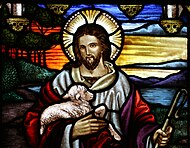
"Catholic" redirects here. For Christians who recognize the authority of the Bishop of Rome (Pope), see Catholic Church. For the whole body of Christians, see Christian Church. For other uses, see Catholic (disambiguation).
Catholicism (from Greek καθολικισμός, katholikismos, "universal doctrine") and its adjectival form Catholic are used as broad terms for describing specific traditions in the Christian churches in theology, doctrine, liturgy, ethics, and spirituality.
"Catholicism" and "Catholic" in this sense refer to the practices of several Christian churches. This sense is to be distinguished from the use of these words to refer to the Roman Catholic Church, that which is in full communion with the Holy See, as well as the Orthodox Catholic Church (commonly called the "Orthodox Church" or the "Eastern Orthodox Church"), which also considers itself the universal and apostolic church.
In the sense of indicating historical continuity of faith and practice from the first millennium, the term "catholic" is employed by many other historic churches which hold themselves to be "heirs of the apostolic faith". These churches consider themselves to be catholic, teaching that the term "designates the historic, orthodox mainstream of Christianity whose doctrine was defined by the ecumenical councils and creeds" and as such, most Reformers "appealed to this catholic tradition and believed they were in continuity with it."
Within the Anglican Communion, the Oxford Movement promoted Anglo-Catholicism, which reemphasized the importance of doctrines such as the Real presence of Christ in the Eucharist and apostolic succession.
The earliest evidence of the use of the term Catholic Church is the Letter to the Smyrnaeans that Ignatius of Antioch wrote in about 108 to Christians in Smyrna. Exhorting Christians to remain closely united with their bishop, he wrote: "Wherever the bishop shall appear, there let the multitude of the people] also be; even as, wherever Jesus Christ is, there is the Catholic Church."
From the second half of the second century, the word began to be used to mean "orthodox" (non-heretical), "because Catholics claimed to teach the whole truth, and to represent the whole Church, while heresy arose out of the exaggeration of some one truth and was essentially partial and local". In 380, Emperor Theodosius I limited use of the term "Catholic Christian" exclusively to those who followed the same faith as Pope Damasus I of Rome and Pope Peter of Alexandria.Numerous other early writers including Cyril of Jerusalem (c. 315–386), Augustine of Hippo (354–430) further developed the use of the term "catholic" in relation to Christianity.



No comments:
Post a Comment